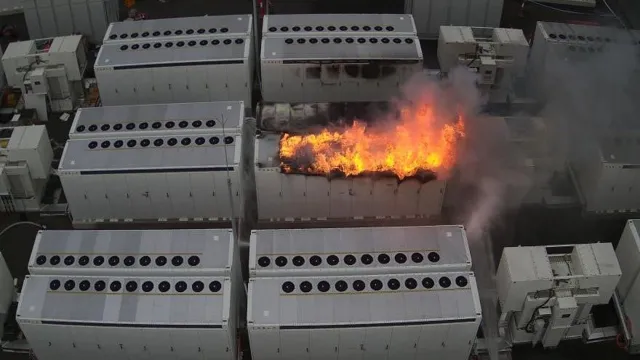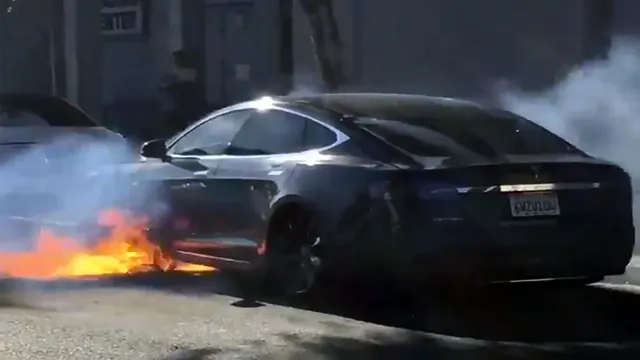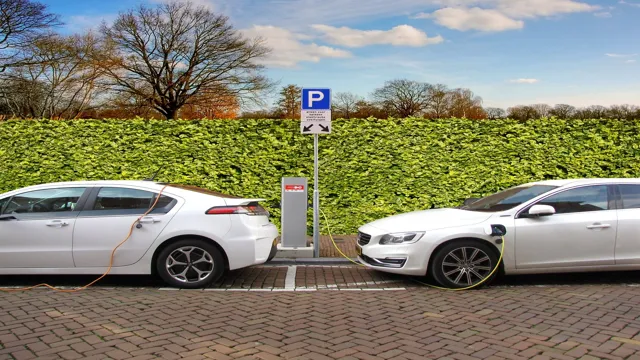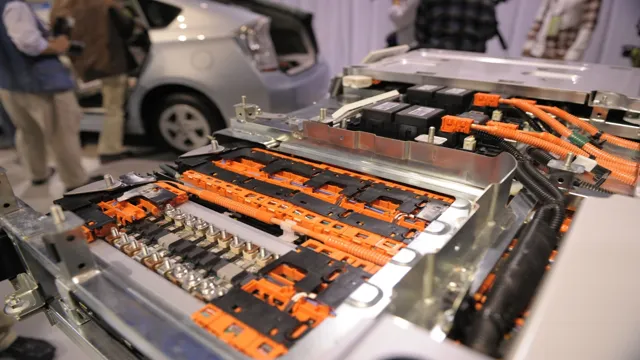Beware the Shocking Truth: The Dangers of Lithium Battery Explosions in Electric Cars
As electric cars become increasingly popular, concerns over the safety of their lithium-ion batteries have also risen. After all, these batteries power the cars we rely on daily, and if they explode, the consequences can be disastrous. Electric car lithium battery explosions have been reported in the news, which begs the question: how safe are these batteries, and what risks do they pose? The truth is, while electric car batteries are generally safe, there have been instances of explosions due to manufacturing defects, damage to the battery, or improper handling.
The risk of an explosion is higher in older or poorly maintained batteries, but even new batteries can malfunction and overheat under certain conditions, such as extreme temperatures or high speed charging. However, it’s essential to note that electric car battery explosions are still relatively rare, and manufacturers are continuously working to improve the safety of these batteries. They use advanced thermal management systems and safety features to prevent overcharging, overheating, and short circuits.
Additionally, most electric car owners follow proper maintenance procedures and environmental guidelines to reduce the risk of battery failure. While the threat of an electric car battery explosion is real, it’s important to remember that every vehicle carries some level of risk. Gasoline cars, for instance, have a much higher chance of catching fire due to fuel leakage or contact with hot engine parts.
In comparison, electric cars are designed with safety in mind, and their batteries are incredibly durable, with a lifespan of several years. Overall, electric car lithium battery explosions are a legitimate concern, but it shouldn’t deter drivers from switching to electric vehicles. As long as owners follow proper maintenance procedures and respect the battery’s power and capabilities, their electric cars should provide safe and reliable transportation for years to come.
Causes
An electric car lithium battery explosion can be caused by a variety of factors. One common cause is overheating of the battery, often due to a defect in the manufacturing process or from excessive stress on the battery. Another cause could be a short circuit, which can occur when the battery terminals make contact with a conductive surface that is not designed to handle the voltage of the battery.
Additionally, a lack of proper maintenance or misuse of the battery, such as overcharging or undercharging, can also contribute to the risk of an explosion. It is important for electric car owners to be aware of the potential causes of lithium battery explosions and to take necessary precautions to prevent them. This includes regularly monitoring the battery’s temperature and charge levels, as well as following the manufacturer’s recommended maintenance guidelines.
Overcharging
Overcharging is a common problem in today’s fast-paced society and can cause a great deal of frustration for consumers. There are several reasons why overcharging occurs, including human error, technical glitches, and intentional misconduct. In some cases, businesses may simply make mistakes when charging customers, whether through incorrect pricing or miscalculations.
Technical glitches can also cause overcharging, such as when computer systems malfunction or billing software is not properly updated. However, intentional misconduct is perhaps the most concerning of all, as businesses may deliberately overcharge customers in order to make a profit. This unethical behavior can result in significant financial harm to consumers and a loss of trust in the business.
Ultimately, it is up to businesses to address overcharging and ensure that they are operating fairly and transparently in all transactions.

Punctured Battery Cells
Punctured battery cells are a common problem in batteries, both rechargeable and non-rechargeable. They occur when the outer casing of the battery is damaged, lead to leakage of the chemical electrolyte inside. This leakage causes corrosion, which can ultimately decrease the battery’s overall lifespan.
One common cause of punctured battery cells is physical damage, such as dropping or crushing. Another cause can be exposure to high temperatures, which can lead to a buildup of pressure inside the battery cell, ultimately resulting in a puncture. Additionally, using the wrong type of batteries or using them past their expiration dates can also increase the risk of punctured battery cells.
It’s important to handle batteries with care to avoid punctures and potential injury from chemical exposure. If you suspect physical damage to your battery or it’s been exposed to high temperatures, it’s best to dispose of it properly and replace it with a new one.
Faulty Battery Management System
One of the most common causes of battery problems in vehicles is a faulty battery management system (BMS). This system is responsible for controlling the charging and discharging of the battery, ensuring that it is working optimally. However, if it is not functioning correctly, it can lead to a range of issues, including reduced battery life, poor performance, and even complete failure.
Some of the most common reasons for a faulty BMS include manufacturing defects, overheating, and electrical issues. In some cases, it may be possible to repair the system, but in others, it may be necessary to replace the battery entirely. If you are experiencing battery issues, it is always best to have the system checked by a professional mechanic to determine the root cause and find the appropriate solution.
What Happens During an Explosion?
Lithium battery explosions in electric cars can be incredibly dangerous and alarming. When an explosion occurs, it is usually due to a thermal runaway reaction within the battery. This happens when the temperature of the battery rises uncontrollably, causing a chemical reaction that generates heat.
If not addressed, this heat can cause a buildup of pressure, ultimately leading to an explosion. Once the battery explodes, it can cause a chain reaction, leading to additional fires and explosions. It is critical to handle electric car lithium batteries with care and to follow the manufacturer’s guidelines to prevent these explosions from occurring.
Overall, it is essential to be aware of the potential hazards of electric car batteries and to educate oneself on the proper methods for handling and maintaining them to prevent these types of explosions.
Thermal Runaway
During a thermal runaway, an explosion can occur when a battery’s internal temperature continues to rise beyond its maximum limit. This is due to a positive feedback loop that occurs when the battery’s temperature rises, resulting in increased chemical reactions, generating more heat, which further raises the temperature. Ultimately, this can cause the battery to burst and release energy in the form of heat, gas, or flames.
Batteries can explode due to various reasons, such as overcharging, manufacturing defects, or physical damage. It is essential to handle batteries with care and ensure they are not exposed to high temperatures to avoid thermal runaway. In case of an explosion, it is recommended to evacuate the area immediately and call for professional help.
Rapid Gas Release
Rapid Gas Release Explosions can happen in a matter of seconds but their devastating effects can last a lifetime. During an explosion, a rapid gas release occurs which can cause a tremendous amount of damage. Explosions occur when there is a buildup of pressure in a confined space, leading to the rapid release of gases.
The explosion can be caused by various factors including heat, electricity, or chemical reactions. The most common cause of explosions is due to combustible materials present in a confined space. Once the gas is released, the pressure wave moves out from the area of the explosion, causing destruction to everything in its path.
The damage caused by the explosion can range from shattered windows and overturned furniture to collapsed buildings and loss of life. It is a reminder of the importance of safety measures and taking precautions to ensure the prevention of explosions.
Fire & Smoke
During an explosion, a sudden release of energy in a confined space can cause devastating effects. These can include fire, smoke, and debris being ejected at high velocities. The explosion’s intensity, duration, and scale depend on the energy source and how it is contained.
Explosions can arise from natural causes such as lightning, volcanic eruptions, or they can be intentional, such as explosive devices or accidents in industrial settings. The blast’s wave propagates, creating a high-pressure zone that sweeps away everything in its path and a low-pressure zone that pulls debris and flammable materials back toward the blast. This dynamic can cause secondary explosions or fires, leading to widespread damage and loss of life within the explosion’s radius.
To mitigate the risks of explosions, it is crucial to identify potential hazards, assess the consequences, and develop appropriate measures for prevention and response.
Prevention Measures
Electric car lithium battery explosions can be a frightening occurrence, but there are steps you can take to prevent them from happening. First and foremost, it is essential to properly maintain the battery, ensuring that it is not overcharged or over-discharged. Regularly inspecting the battery for any damage or signs of wear can also help prevent a potential explosion.
Additionally, it is important to use high-quality chargers and avoid using third-party charging equipment that may be incompatible with the battery. When transporting or storing the battery, make sure to follow all guidelines and keep it in a cool, dry place away from flammable materials. By adhering to these prevention measures, you can significantly reduce the risk of an electric car lithium battery explosion and ensure safe driving.
Regular Maintenance
Regular maintenance is essential to keep our belongings in good condition for a longer time. Prevention measures should be taken to avoid a sudden breakdown of our appliances or equipment. For instance, cleaning the pipes of your air conditioner or heater monthly or quarterly will help avoid clogs or blockages that may disrupt its function.
Another example is changing the oil or checking tire pressure in our vehicles to ensure that they are performing correctly. These kinds of small yet important activities must be performed on a regular basis to eliminate high-cost repairs and prolong the life of our belongings. Think of it like getting regular check-ups with a doctor to ensure that everything in your body runs smoothly.
Don’t wait for things to go wrong before taking preventive measures. Stay ahead of the game and ensure your belongings serve you well for a long time.
Proper Charging Practices
Proper Charging Practices As many electronic devices rely on rechargeable batteries, it’s important to maintain proper charging practices to avoid battery damage and maximize their lifespan. Prevention measures are key to ensuring that your batteries last longer and perform better. Firstly, it’s best to always use the original charger that came with the device, as it’s specifically designed for it.
Additionally, avoid overcharging and keeping devices plugged in once they have reached 100% as it can damage the battery. Furthermore, it’s advisable to keep devices at room temperature while charging, as high or low temperatures can also harm the battery. Lastly, it’s important to periodically discharge the batteries fully and recharge them to maintain the maximum capacity.
Overall, acquiring good charging habits can not only extend battery life and save you money but also maintain uninterrupted device usage.
Conclusion
In conclusion, the only thing that should be exploding about electric cars and lithium batteries are the myths and misconceptions about their safety. While accidents can happen, they are incredibly rare and often caused by external factors. With ongoing advancements in technology and safety measures, we can continue to enjoy the many benefits of electric cars without fear of fiery explosions.
So let’s put our worries to rest and embrace the electrifying future of transportation!”
FAQs
What is an electric car lithium battery?
An electric car lithium battery is a type of rechargeable battery that is commonly used in electric vehicles.
What is the risk of lithium battery explosions in electric cars?
Lithium battery explosions in electric cars are rare but can occur due to defective manufacturing or damage to the battery.
How can lithium battery explosions in electric cars be prevented?
Lithium battery explosions in electric cars can be prevented by proper maintenance of the battery and ensuring it is not overheated or damaged.
What should you do if you suspect a lithium battery explosion in your electric car?
If you suspect a lithium battery explosion in your electric car, you should immediately exit the vehicle and contact emergency services.




